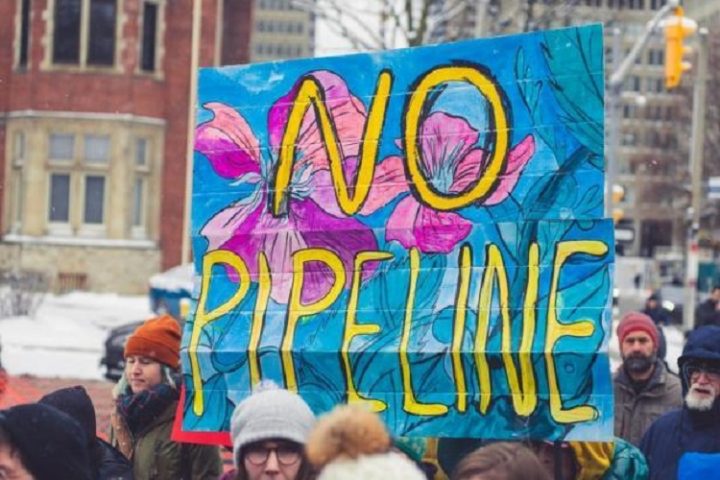The Wet’suwet’en hereditary chiefs and the B.C. and Canadian governments have come to a tentative agreement about rights and title, but none of the parties have changed their position on the controversial Coastal GasLink pipeline.
Chief Woos, who represents the Gidimt’en clan of the Wet’suwet’en, said the past three days of discussion were preliminary in nature and focused on ensuring that the needed respect was present.
“We are the land, and the land is ours. The degree of satisfaction is not what we expected, but at the same time we’re looking at the other avenues, and we’ll see where that brings us. The hereditary chiefs are opposed to any pipeline going through our territory,” he said. “We’ve maintained that since day one.” (Ricochet Media)
Last weekend many protests and gatherings were organized in cities accross Canada to show solidarity with Wet’suwet’en hereditary leaders.
On Saturday in New Westminster British Colombia about 30 people gathered at Hyack Square and showed solidarity with Wet’suwet’en hereditary leaders. New Westminster resident Christa MacArthur invited community members to join her in a peaceful demonstration of support of Wet’suwet’en hereditary leaders who oppose construction of a natural gas pipeline through their traditional territory in northern British Columbia.
“What does a white woman like me, who has never been to Wet’suwet’en territory, know about the situation? Not much. What right do I have to speak to the dispute over the LNG pipeline through Wet’suwet’en territory? None. And so I won’t. I won’t speak to the pipeline or the Wet’suwet’en Nation,” she said. “I want to speak to how our community can support Indigenous people. We can listen to Indigenous voices. Listen to their visions for the future of this land and its peoples. Their voices have been powerful and clear. We need to listen to them, hold each other accountable, and demand better from our own leaders. Indigenous people across this land have experienced increased hatred and racism, in words and in actions, as tensions have risen. This is their home. This is their home,” MacArthur told a crowd of about 30 people at Hyack Square. “We need to not be silent bystanders. We need to be brave and speak out against hatred.” (New Westminster)
On Monday in Montreal, protesters briefly blocked railway tracks in Pointe-Saint-Charles neighbourhood and some resident from Rosement neighbourhood also blocked railway tracks for few hours in support of the Wet’suwet’en hereditary chiefs. The rail barricade comes after hereditary chiefs and senior ministers of the federal and British Columbia governments struck a proposed agreement on land rights.
“We are blocking this rail line in response to the call from Wet’suwet’en hereditary chiefs to support Indigenous sovereignty and in recognition of the urgency of stopping resource extraction projects threatening future generations,” said Sara Mullins, a participant in the protest.(Global News)
Molly Wickham, spokesperson for the Gidimt’en clan of the Wet’suwet’en, says the nation’s struggle for sovereignty is not over, following the tentative agreement between the Wet’suwet’en and the B.C. and Canadian governments. (Ricochet Media)
«We don’t need the province, we don’t need the federal government to know that we have full jurisdiction over our territories,» said Wickham. (Ricochet Media)
Ricochet reported yesterday that although the tentative agreement concerns Wet’suwet’en rights and title, it does not resolve the ongoing dispute over the Coastal GasLink pipeline. None of the parties involved have changed their position on the controversial project, and Chief Woos of the Gidimt’en clan said at a press conference that the hereditary chiefs remain.






